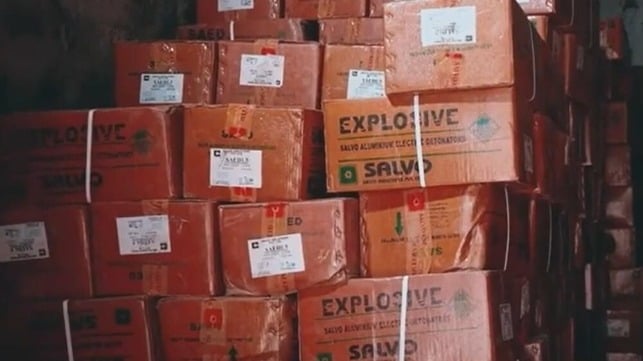Yemen's Houthi Rebels are Already Rearming

A video released by Yemen’s National Resistance Forces (NRF) on May 10 shows an at-sea interdiction of bomb-making material destined for Yemen's Houthi terrorist group. The components seized suggest that the equipment was to be used to build remotely-detonated bombs, including boat bombs of the type used to attack merchant shipping in the Red Sea and Gulf of Aden.
The timing of the interdiction was not disclosed, but the video was published days after U.S. President Donald Trump ended a monthlong, $1 billion-plus military campaign to reduce the Houthis’ capability to threaten shipping.
The National Resistance Forces are an Emirati-sponsored faction, nominally part of the recognized government of Yemen, and is controlled by Tareq Mohammed Abdullah Saleh - nephew of the former president of Yemen Ali Abdullah Saleh, who was assassinated by the Houthis in 2017. The NRF controls an area of Yemen southwest of Taiz, including the Red Sea coastline around the port of Mocha. Tareq Saleh has recently recommended a boots-on-the-ground approach to combating the Houthis.
The NRF’s First Marine Infantry Brigade captured the material aboard two small dhows, which had set off from Djibouti and were heading for the Houthi-controlled port of Ras Isa. The seized dhows, material and 14 crewmembers were brought into the port of Mocha.
????? ???? ???????? ??????? ?????? ????? "????? ?????" ?????? ????? ??????? ?????? ????????? ??? ????? ??????? ?? ????? ???? ??????? ???? ??????? ?????? ??????????? ?????? ?? ????????.
— ???????? ??????? (@nrfyemen) May 10, 2025
????? ??????? ??????? ???????? ??????? ??? ?????? ?? ?????? ????? ???? ???? ???? ??????? ????… pic.twitter.com/c1adIJLdLj
The NRF reported that very large quantities of ‘electric aluminum detonators’ and ‘detonator cord’ had been seized, as well as 64 satellite communication devices. The exact amounts seized may have been lost in translation, but from pictures of the captured material, the quantities were indeed substantial; in one picture alone, 36 kilometers of detonator cord can be counted.

that matters most
Get the latest maritime news delivered to your inbox daily.
From markings on the boxes, it appears that the explosive materials were manufactured for the mining industry by two Indian companies, Salvo Explosives of Hyderabad, and CDET Explosive Industries of Secunderabad.
The video shows labeled packaging and devices that appear to be Thuraya XT-PRO satellite phones (with FDU-XT docking stations). The UAE-based satcom company provides commercial satellite network coverage with pre-paid access from five of its own geostationary satellites, as well as associated handsets and ground equipment.
